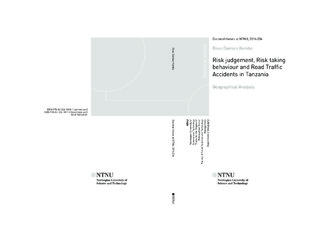Risk judgement, Risk taking behaviour and Road Traffic Accidents in Tanzania: Geographical Analysis
Doctoral thesis
Permanent lenke
http://hdl.handle.net/11250/2403537Utgivelsesdato
2016Metadata
Vis full innførselSamlinger
- Institutt for geografi [1108]
Sammendrag
Urban road traffic and driving culture in Tanzania is partly characterised by low level of safety behaviour. The present study has investigated road users’; 1) underlying pattern and tendencies of their risk perception, risk attitudes, risk willingness and risk taking behaviour by geographical areas, gender and age groups. 2) The important factors contributing to their risk taking behaviour on road traffic when experiencing different levels of system risk and 3) the extent such factors are attributed to contextual conditions in each type of geographical area and to compositional condition.
The thesis builds its conceptual model based on an extensive review of literature related to the main philosophical orientations in Human Geography. Four theoretical approaches were used: 1) system approach guided by a model for safe traffic system, 2) risk theory and cultural approach, 3) political ecology approach and 4) modernization approach. The methodology of the study was based on triangulation approach. Data collection methods involved a questionnaire survey, interviews, focus group discussion and observation. A sample of 671 respondents were surveyed and a sample of 17 informants were interviewed. In the analysis;1) the reliability and the validity of the measure instrument in a survey data were examined by a set of statistical techniques; this included exploratory factor analysis. 2) Both MANOVA and ANOVA, along with descriptive statistics and post-hoc test were used to compare means of risk perception, risk attitude, risk willingness and risk taking behaviour by geographical areas, gender and age groups. 3) Step wise linear regression analysis was used to select the best-fit model in explaining risk-taking behaviour of Tanzanian public on traffic. 4) A four-step data analytic method by Baron and Kenny (1986) was used to examine mediation effect underlying an observed relationship between religious belief and risk taking behaviour. 5) Contextual as well as content analysis techniques were used to analyse the transcribed interviews with lay people as well as experts and other key informants.
The results revealed that; the attitude towards rule violation is higher in rural areas than in urban and semi-urban areas. 36.8% of the variance in risk taking behaviour associated with road traffic accidents is explained by the contribution of 1) risk attitude, 2) religious belief, 3) risk willingness and 4) geographical area. The factor religious belief had a greater effect on risk taking behaviour compared to other explanatory factors.
In general, the contribution of this thesis is not in formulating a new theory of road accident risk analysis but rather in giving road accident risk analysis a firm spatial dimension and generating detailed knowledge on this issue in low/income country. The overall conclusion is that, the geographical context of urban-rural difference in Tanzania plays a significant role in analysing road user behaviour. Road users in Tanzania perform or reproduce behaviours that are themselves a product of the relationship between their local environment and traffic related technology in traffic system that surrounds them.
